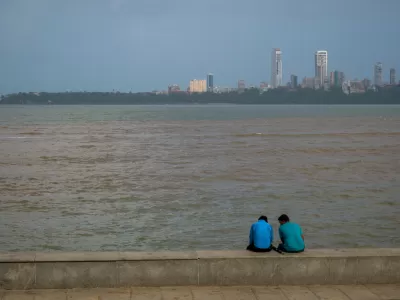A critique of a proposed "smart cities" development in Mumbai reveals how much work remains in providing the resources and maintaining the rigor to built sustainable, resilient, liveable cities.

Hugh Byrd revisits an ambitious proposal by the Indian Government to build 100 "smart cities," with a case study provided by a development in Mumbai known as Bhendi Bazaar. The 40- to 60-story towers that will replace three- to five-story townhomes have been described as "vertical with a vengeance" in its approach to density.
Byrd, however, has analyzed the project's plans using an Urban metabolism model, "which measures the impacts of the built environment, we have assessed its overall impact."
The result of that analysis was not favorable: "Our research shows that the proposal is neither smart nor sustainable." In more detail, Byrd reveals how the project falls short of the Indian government's own definitions of "smart"—as measured by 11 objectives.
The kicker of the post is not about the failure of engineering or development relative to the ambitions promoted to the public, but rather that the planning goal of making cities smart and liveable lacks the resources to become a reality.
FULL STORY: Smart or dumb? The real impact of India’s proposal to build 100 smart cities

Planetizen Federal Action Tracker
A weekly monitor of how Trump’s orders and actions are impacting planners and planning in America.

Maui's Vacation Rental Debate Turns Ugly
Verbal attacks, misinformation campaigns and fistfights plague a high-stakes debate to convert thousands of vacation rentals into long-term housing.

Restaurant Patios Were a Pandemic Win — Why Were They so Hard to Keep?
Social distancing requirements and changes in travel patterns prompted cities to pilot new uses for street and sidewalk space. Then it got complicated.

In California Battle of Housing vs. Environment, Housing Just Won
A new state law significantly limits the power of CEQA, an environmental review law that served as a powerful tool for blocking new development.

Boulder Eliminates Parking Minimums Citywide
Officials estimate the cost of building a single underground parking space at up to $100,000.

Orange County, Florida Adopts Largest US “Sprawl Repair” Code
The ‘Orange Code’ seeks to rectify decades of sprawl-inducing, car-oriented development.
Urban Design for Planners 1: Software Tools
This six-course series explores essential urban design concepts using open source software and equips planners with the tools they need to participate fully in the urban design process.
Planning for Universal Design
Learn the tools for implementing Universal Design in planning regulations.
Heyer Gruel & Associates PA
JM Goldson LLC
Custer County Colorado
City of Camden Redevelopment Agency
City of Astoria
Transportation Research & Education Center (TREC) at Portland State University
Jefferson Parish Government
Camden Redevelopment Agency
City of Claremont




























